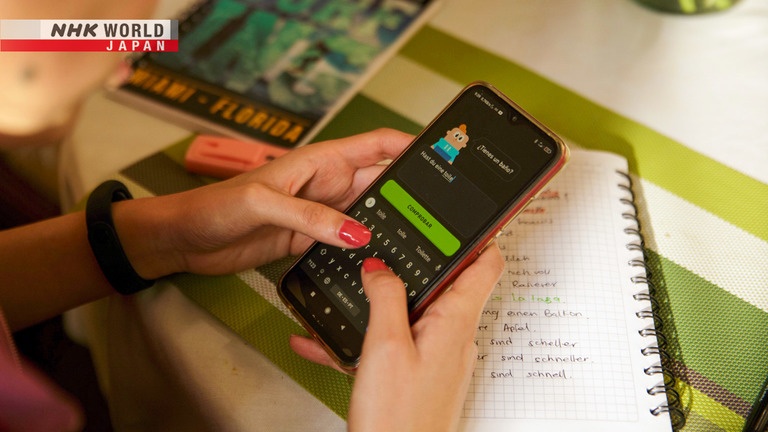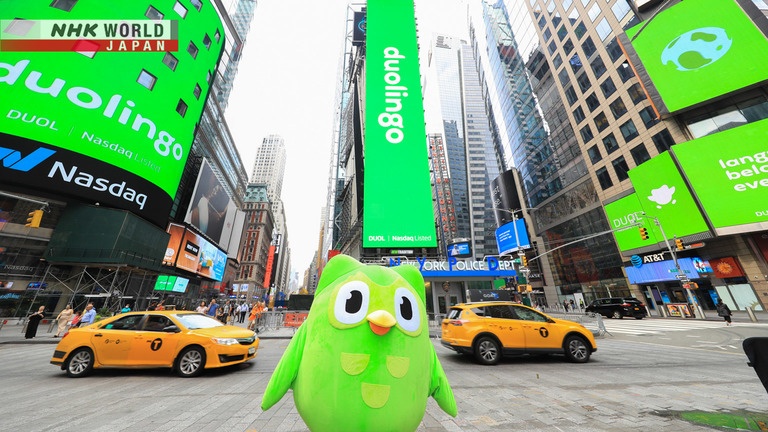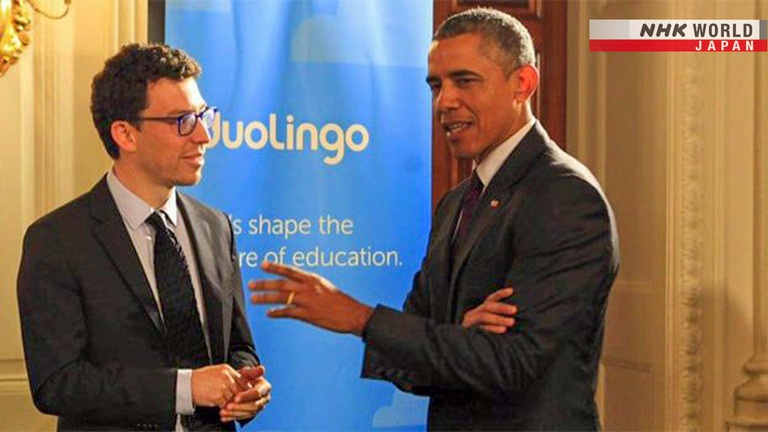Education at Hand: Luis von Ahn / Co-Founder & CEO of Duolingo
Luis von Ahn created the most used educational app, Duolingo. The app teaches 40+ languages on a smartphone to its 72 million monthly active users for free. He aims to make learning available to all.



Transcript
Direct Talk
Today's guest is Luis von Ahn.
He is the co-founder & CEO of Duolingo.
Luis created one of the most used
language learning apps in the world.
As a gifted computer scientist,
he first developed anti-hacker login systems.
He then went on to create
his popular language app.
We ask Luis more about
why he decided to develop Duolingo,
what is behind his success
and why he is offering it for free.
The mission is to develop the best education
in the world and make it universally available.
Duolingo is a language learning app,
also known for its owl character.
One can learn languages
by answering questions
provided by the app every day.
It only takes a few minutes.
There are more than 40 language courses
available on Duolingo.
If you have a smartphone,
the service is basically free.
You will only have to pay if you
don't want to see advertisements on the app.
Duolingo has 72 million
monthly active users worldwide.
While education is readily available
in the developed world...
It's estimated that about
200 million children worldwide
can't attend school.
Luis is trying to change this with Duolingo.
For education.
Education has always been my passion.
I saw that
the people who have a lot of money
can buy themselves a very good education
and therefore continue having a lot of money,
whereas people who don't have very much money
barely learn how to read and write
and therefore never make a lot of money.
So I wanted to do something that would
give access to education for everybody.
And so I started wanting
to work in education.
And then,
you know, I thought,
well, what should we teach?
We started working on education
and we settled on teaching languages
for a number of reasons.
But the biggest reason was
because English is so transformative
in almost every country in the world.
In most countries in the world,
knowledge of English can significantly
increase your income potential.
You can make more money by knowing English.
What's special about Duolingo's app is that
it analyzes the user's learning history,
updates the curriculum and automatically
provides the most suitable learning program.
The only way in which we use
the user's data is to teach better.
We don't use it for anything,
You know, we don't sell it
or anything like that.
We just use the data to teach better.
And the way we use it is,
you know, we watch
every one of our learners learn
and every single day
they answer about 1 billion exercises
every day.
And so we watch everything
that they're doing.
And for a given learner, we look at
all the things that every exercise they did.
And based on that, we build a model
for each learner that tells us
for this particular learner they are not
very good at the past tense, for example.
And then we and now we know that.
And so whenever
you start a lesson on Duolingo,
we know because we've watched you learn,
we know that you're not
very good at the past tense.
So we may give you more exercises related to
the past tense so that you're better at it.
So we basically use the data from
what all learners to be able to personalize
and give you better lessons for you.
And that has worked really well.
And so generally we're just,
we're trying to develop
really, really good education
through smartphones
so that everybody can get it.
Luis was born in Guatemala in 1978.
His mother was a doctor.
The school system wasn't
well established at the time.
So his mother got him in to
the American School of Guatemala,
which was a private school in Guatemala City.
My mother spent all of her money.
Literally all of her money on my education.
When I was eight years old,
I wanted the Nintendo,
but instead of a Nintendo,
she bought me a computer.
And that's, you know, I would say the reason
I am here today is because my mother
spent so much of her effort on my education.
You know Guatemala's poor country.
And I think she saw that
if I wanted to get ahead in life,
I needed to be well-educated.
Fortunately, she herself,
she was, you know, the first generation
that went to university.
She was a medical doctor.
And so she saw the value of education.
And I think
I think that's why.
Luis studied hard to meet
his mother's expectations.
After high school,
he entered Duke University,
and graduated with a
Bachelor of Science in Mathematics.
He later earned his PhD in Computer Science
at Carnegie Mellon University.
I was a first year PhD student
at Carnegie Mellon University,
and I
attended the lecture
by the chief scientist of Yahoo!
Which at the time Yahoo!
was the biggest company in Internet.
And it was a lecture about ten problems
that they didn't know how to solve at Yahoo!
And, you know,
I listened to the lecture and I thought,
maybe I'll try to solve one of these.
Luis' idea was to fight off hackers
who were using malware to steal
millions of Yahoo accounts.
You know, I listen to the problem
and then I went home
and then I started thinking
about it for a long time,
and that's when the idea came up of CAPTCHA.
Luis came up with the idea
to use distorted characters
displayed during login
for computers at the time.
The letters were made unreadable
by rogue viruses,
but could be identified by human eyes.
The system was called 'CAPTCHA'
and became a huge success.
But Luis wasn't satisfied
with his accomplishment.
About five years after
I helped invent the CAPTCHA,
you know, everybody that I
you know, if I met a new person
and they would ask me what I did,
I eventually told them
that I had invented that.
And everybody told me that
they really didn't like that.
And I started feeling a little bad.
And then I started also thinking that
each time somebody types these letters,
they waste about 10 seconds of their time.
And it turned out
200 million times a day,
somebody was typing these letters.
So if you multiply 10 seconds by 200 million,
you get that humanity as a whole is wasting
what's wasting like 500,000 hours every day
typing these CAPTCHA.
So I started feeling bad
and then I started thinking,
okay, during those 10 seconds,
can we get the human to do useful work?
Because the thing is,
during those 10 seconds, the human was doing
something that computers could not do.
So it was actually valuable.
Could we get them to do
something that was useful?
And,
and it occurred to me that we could get
humans to help us digitize books.
Old books that have been discolored can't be
easily deciphered by the computer.
So, the words were taken out,
distorted and displayed.
The user then enters the letters to log in.
The text entered was then
used to digitize books.
Whenever you were trying
to get an email account in Yahoo!
or buy tickets or something like that,
you would be helping us
or helping the world digitize books.
This system called reCAPTCHA,
has been adopted around the world.
The invention was
another great success for Luis.
Meanwhile, he says he was constantly
thinking about his native country.
In Guatemala, there exists a huge
educational gap between the rich and poor.
So, Luis decided to tackle this problem.
After I sold,
my previous company was reCAPTCHA,
I sold that company to Google.
I wanted to do something related to education
because it was always my passion.
Also,
I wanted to, in particular
wanted to do something
that would give education to everyone
because I saw the difference,
particularly coming,
growing up in a poor country like Guatemala.
So what should people learn?
The answer
was the English language.
And it's very nice because it's direct,
see, for example,
mathematics.
If you learn math by itself,
you don't make more money
because usually you learn math
to learn physics,
to then become an engineer
like it's multiple steps.
But if you learn English,
you could be a waiter.
And now you know English, you can be
a waiter at a hotel and make more money
So you can, so it's just knowledge of English
can make you more money.
So we thought, okay,
well then let's teach English.
And if we're going to teach English,
we may as well have each other languages.
And this is when we decided,
let's teach languages in general and
let's make it a free way to learn languages.
Luis worked with a Swiss friend
to develop a language learning app.
However, they hit an unexpected roadblock.
Yes. The first challenge that we faced
was before we launched Duolingo.
We were developing it, and,
my co-founder, Severin,
he's a native German speaker,
and I am a native Spanish speaker.
And we decided that we would do to develop
the platform was I would make
the Spanish course for him to learn Spanish
and he would make the German course
for me to learn German.
And we started learning
each other's language.
And the first challenge
that we ran into was that
we would come into work every day.
And I would ask him,
"Did you did you do your Spanish lesson?"
And he would say,
"Oh, no, it was so boring so I didn't do it."
And same, you know,
the same thing happened to me.
I didn't want to do it because
learning German was also boring.
So the first challenge we realized is
it's very hard to learn a language
by yourself because it's so boring.
I'm a big believer that the hardest thing
about learning something by yourself
or a language by yourself
is staying motivated.
Learning a language alone isn't fun.
Having realized this, Luis introduced
some fun elements for Duolingo.
It was learning like
trying to solve a puzzle game.
If you get the correct answer, you can get
complimented by a cute character.
If you continue with the hard work,
you will be rewarded
with tokens, like gems.
Duolingo does a great job with that
in terms of just making it
feel like you're playing a game.
Today, automatic translation features
are available on most
smartphones and computers.
So, why does Luis still think
that people should learn
and acquire foreign language skills?
Well, there's a number of reasons.
The biggest one is, you know,
it's true computers already and
not just today in the last 10 years
our computers have been
very good at doing translation.
And if you're going to go for a quick trip
to Japan or for a quick trip to France,
a computer is great
and you should probably do that.
That's much better than
trying to learn five words.
However,
I think if you want to actually learn English
or if you want to actually learn French
and actually communicate in those languages,
I don't think you can have a device
right next to you at all times.
Kind of doing the translation
is very slow and very awkward.
You actually need to learn it.
And so for our users,
all the ones that are learning English
actually want to learn English,
and they couldn't rely on a device.
School attendance for girls
is low in Guatemala.
In 2021, Luis started
the Luis von Ahn Foundation
to improve the situation in Guatemala,
including education for girls.
I started a foundation about two years ago
to help Guatemala,
which is the country I came from.
You know, it's a very poor country, and
it's also a very dysfunctional government.
So we're trying to do many of the things
that the government doesn't do,
in particular, the thing that we're trying
to help with is the education of young girls.
What happens in countries like Guatemala,
it's many countries that are similar is that,
when families have to make a decision
about which of the children to educate,
they prioritize the boys and not the girls.
And many families have to decide.
We can only educate one of our children
and they will prioritize a boy not a girl
and, well, we think that's unfair.
But it's not just unfair.
It's also, in general, bad for the country,
because it turns out that
if you have to prioritize one,
it is in fact better to prioritize
the girl than the boy
because the girl is actually going
to be the mother in the next generation.
And the intelligence and education
of the mother is much more
highly correlated with the
next generation than the fathers.
So we have it all wrong.
So we're spending a lot of money on trying to
educate girls in general in Guatemala.
Luis left us with his favorite words.
Strive for excellence.
What it means is that
I really want it to be the case
that all our products are really perfect.
Try as much as we can.
Yeah, we've always wanted to teach
not just languages,
we wanted to teach many things
through mobile phones.
And we thought that
that we could start
by teaching math, for example.
So we have a math course.
We're working on teaching music,
so we're in the next few months
there will also be a music course
and you know, we're just very excited.
These are just things that people
really want to learn and get better at,
and we're gonna continue
adding more subjects.